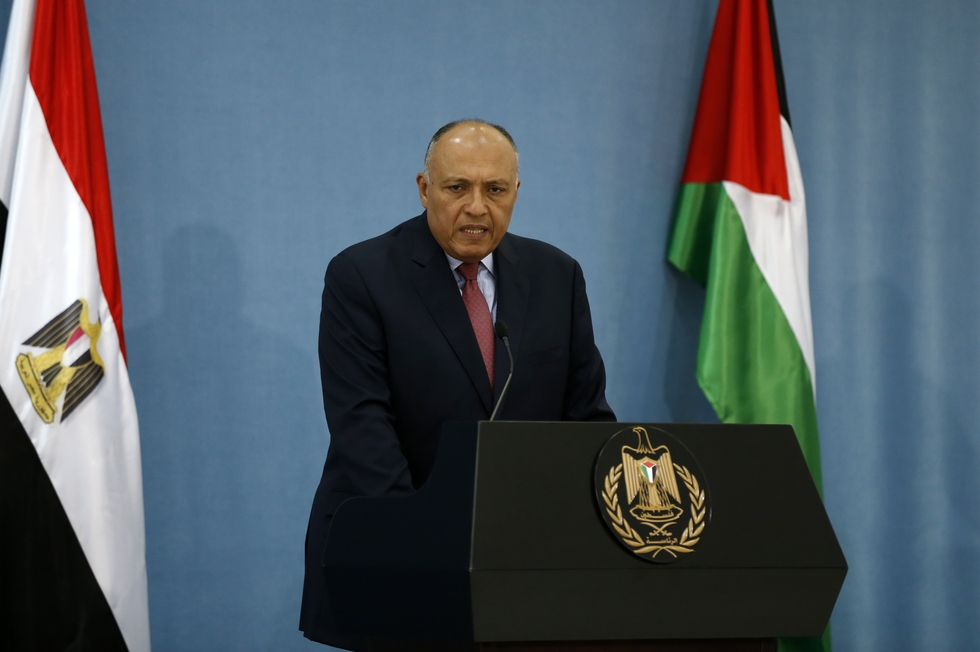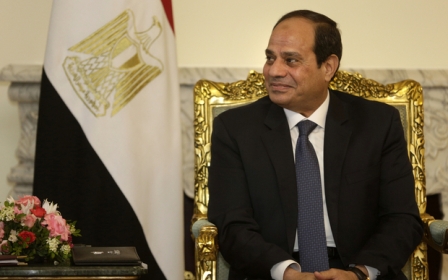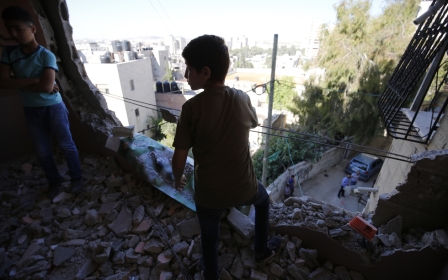Egypt's foreign minister heads to Israel for rare visit
Sameh Shoukry will talk to Israeli officials about how to advance the stalled peace process between Israel and the Palestinians

Egypt's Foreign Minister Sameh Shoukry speaks during a press conference in Ramallah (AFP)
Published date: 10 July 2016 10:14 BST
|
Last update: 8 years 4 months ago
Egypt's foreign minister is to meet Prime Minister Benjamin Netanyahu on Sunday on reviving peace efforts with the Palestinians, on the first such visit to Israel in nearly a decade that is the latest sign of warming ties.
The trip comes amid talk of reviving an Arab peace initiative with the Palestinians and with Israel's military having recently saluted "unprecedented" intelligence cooperation with Egypt to combat militants of the Islamic State group.
Foreign Minister Sameh Shoukry was to hold "lengthy talks" with Netanyahu on reviving the peace process with the Palestinians, an Egyptian foreign ministry statement said.
Shoukry's trip to Israel comes after he visited the West Bank city of Ramallah on June 29 for talks with Palestinian leaders.
Netanyahu confirmed the visit at the start of a cabinet meeting on Sunday and said the last such trip by an Egyptian foreign minister was in 2007.
There would be two meetings -- one on Sunday afternoon and one in the evening.
"This visit is important for several reasons," said Netanyahu.
"It reflects the change in relations between Israel and Egypt, including President Sisi's important call to advance the peace process with the Palestinians and with Arab countries."
Egyptian President Abdel Fattah al-Sisi said in May that there was a "real opportunity" for an Israeli-Palestinian deal that could lead to warmer ties between his country and Israel.
Sisi urged Israelis and Palestinians to seize what he said was a "real opportunity" and hailed his own country's peace deal with Israel.
The Egyptian statement on Sunday said the two would discuss "laying the foundation and specifics of confidence-building between Palestinians and Israelis to create a supportive environment to resume direct negotiations between them with the aim of reaching a comprehensive and just solution."
Intelligence cooperation
In 1979, Egypt was the first Arab country to sign a peace treaty with Israel after years of conflict, and it remains an influential player in the region.
In June, representatives from 28 Arab and Western countries, the Arab League, European Union and the United Nations met in Paris to discuss ways in which the international community could help advance the Palestinian-Israel peace process.
Israel strongly opposes that initiative, which is being promoted by France.
Netanyahu has at the same time spoken of reviving a long-dormant Arab peace initiative dating to 2002.
The proposal essentially calls for Israel to withdraw from the occupied territories and resolve the issue of refugees with the Palestinians, leading to the creation of a Palestinian state, in exchange for normalised relations with Arab countries.
But some analysts have questioned whether Netanyahu's comments were a bid to fend off international critics over his appointment of hardline Defence Minister Avigdor Lieberman and his strong opposition to the French peace initiative.
He has said he would seek changes to the Arab proposal. The Arab League has said the terms cannot be changed.
Egypt and Israel have cooperated in other areas, particularly with jihadist fighters in Egypt's Sinai peninsula having pledged allegiance in November 2014 to Islamic State.
In April, the Israeli military's deputy chief of staff spoke of an "unprecedented level of cooperation" with Egypt, mainly regarding intelligence.
Major General Yair Golan said "there is a strong feeling in the region... that we have to put aside past animosities and concentrate on mutual interests and working together" to deal with the jihadist threat.
However, he cautioned "that's between defence establishments, and I wouldn't describe that as some sort of reconciliation between the people.
"But it is a good starting point, and I'm quite optimistic concerning that."
New MEE newsletter: Jerusalem Dispatch
Sign up to get the latest insights and analysis on Israel-Palestine, alongside Turkey Unpacked and other MEE newsletters
Middle East Eye delivers independent and unrivalled coverage and analysis of the Middle East, North Africa and beyond. To learn more about republishing this content and the associated fees, please fill out this form. More about MEE can be found here.




